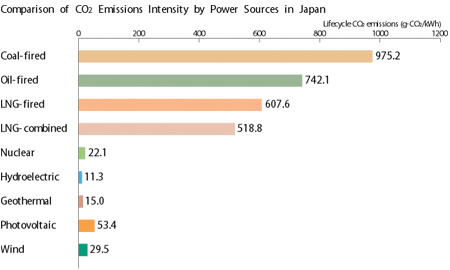A Future Without Nuclear Energy?
Japan's Advisory Committee for Resources and Energy, a consulting
body to the Minister of Economy, Trade and Industry, is taking
a new look at the Long-Term Energy Supply and Demand Outlook as
part of a study on Japanese energy policy. In the review process,
the committee has worked out several quantitative scenarios in
order to stabilize the nation's energy-oriented CO2 emissions
in fiscal 2010 in relation to 1990 levels. One of these scenarios
predicts that if nuclear power plants, which produce no CO2 in
the power generation process, are not newly constructed in the
years ahead, then efforts will be needed to reduce CO2 emissions
substantially. If the expenses involved in achieving CO2 reductions
are to be covered by taxpayers, the Japanese economy will eventually
experience zero growth during the period from fiscal 2008 to fiscal
2010, and nearly 2.28 million job opportunities will be lost.
The Japanese electric power industry takes this projection as
proof of the necessity of nuclear power in the effort to combat
global warming. Therefore, we are determined to continue our consistent
endeavors toward the utilization and development of nuclear energy.
 |
Note: CO2 emissions were calculated by counting
energy consumed in all activities including fuel mining, facilities
construction, fuel transport, fuel refining, fuel consumption
(i.e., power generation); maintenance activities; and spent
fuel reprocessing and high-level radioactive waste disposal
in the case of nuclear power.
Source: Report by the Central Research Institute of the Electric
Power Industry |
|